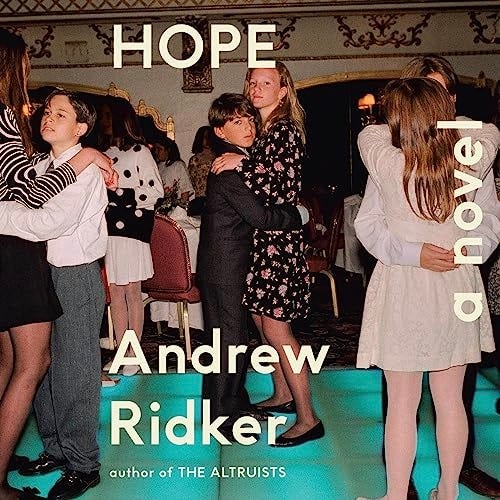BookLife Review by Carol O'Day: Hope (Andrew Ridker, author)
literary fiction, Brookline, MA, clinical research fraud, family fracture, teacher-student violation, open marriage, refugees, Jewish heritage trip, publishing, trauma, healing, self-discovery
Hope by Andrew Ridker is the story of a family in crisis, and the four family members’ efforts to heal themselves as each finds his or her new normal in the aftermath. The story is set in Brookline, Massachusetts in 2013 and its events transpire over the course of about a year. It is told from multiple points of view; segments of the book are told from the point of view of the father, mother, daughter and son. The family is Jewish and the primary events transpire when the daughter is out of college and the son is away at college, but there are flashbacks to earlier years. The humor here is at best dark, and is regularly tragic and self-deprecating.
Scott, the father, is a Harvard-educated but deeply unsatisfied and needy cardiologist. He feels entitled to more than he has and considers himself deprived of much, despite his life of privilege, owing perhaps in part, to his needy, overbearing widowed mother. To assuage his need, and a financial loss, Scott commits fraud in his clinical research, which he attempts to explain away as a “minor misstep” that is “commonplace” and not really a big deal. He intentionally falsifies medical records and clinical samples and submits his own blood to obtain multiple payments from the trial’s sponsor. His actions cause a ripple of distrust and disgust from his wife and children. He is unmoored and lost.
Deb, mother, wife, former dancer and an advocate for refugees and social justice, had persuaded Scott to open their marriage before the fraud. She moves out of their family home shortly thereafter. Deb is engaged in a journey to rediscover herself in mid-life, including exploring her sexuality. She spends some time living with her female lover, not knowing that her daughter had seen her with another woman years earlier and harbors significant resentment toward her mom.
Daughter Maya, one meaning of which is “illusion”, lives in her own world– not fully tethered to reality and responsibility. Victim of and wounded by an inappropriate high school relationship with a young substitute teacher, Maya struggles to gain her footing in her chosen field of publishing after college. She romanticizes the past relationship, and then reignites her affair with the former teacher while she is living with her long-term boyfriend. She is awash in her infidelity and cannot locate her moral compass. A breach at work unravels her and compels her to make sense of her world.
Son Gideon, whose name means warrior, is on a pre-med path but is derailed by his father’s conduct and its consequences. A serial romantic, Gideon always moved most comfortably through the world when in love and with a girlfriend, but the disruption and disillusionment he experiences as a result of his father’s fundamental dishonesty derails him; he drops out of Columbia with only weeks to go until graduation, moves home for a spell and then decides to make a heritage trip to Israel. There he is persuaded to enlist in a rebel group battling for a homeland for ethnic Kurds.
Each segment of the book centers on one member of the family, while referencing and weaving in the other primary characters. Ridker’s multiple points of views allow him to give a more direct and compelling account of the impact of the family fracture on each of its members. For me, this was a tragic story, with a marginally uplifting, though unresolved ending. The title, Hope, seems a stretch for the darkness, traumas and struggles the book contains, but one might see that virtue in the characters’ ultimate ability to each forge an authentic and meaningful pathway out of their family’s fracture.




